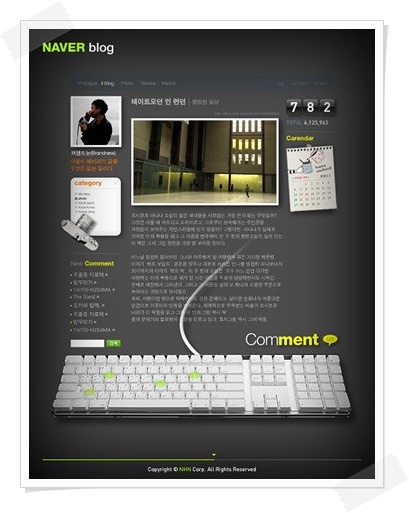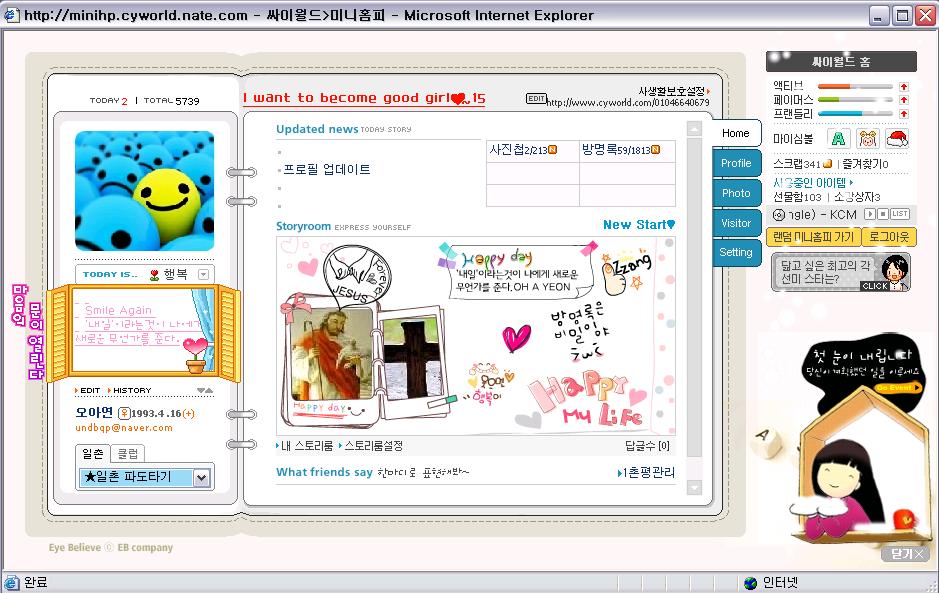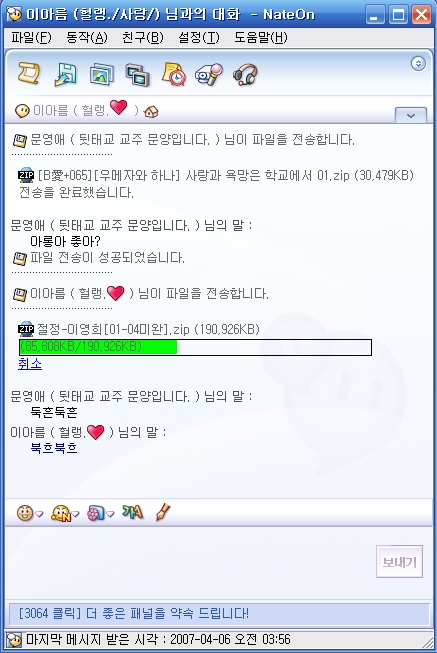When we think about the reasons why blogs and messengers are so successful, convenience, saving time and its effectiveness are always mentioned. However, there are some negative effects come with benefits. For example, when our lecturer Reina taught in Singapore, some students chatted only by using messenger even though they could talk face to face. That was because there was wireless internet access everywhere in university.
“My son sits in front of the computer and chat with his friends for the whole day.”
Have you heard about that before? Some parents find it is really hard to communicate with their children, as they cannot confiscate the computer from them. The use of computer will be a part of our education in the future.
Because of those facts, the gap between parents and children would start to grow further apart. They spend less time together and as a result of that, it might cause the lack of understanding. Therefore, arguments would occur and it can slowly destroy the relationship between parents and their children.
This matter made us think about the problem of over computer usage, and it will become a common problem in teenage group. There is an interesting discovery as they may not know how to present themselves face to face instead of typing messages into computer. It could be due to over-using computer as others have already known and chatted what their friends did or think through their blogs or messengers.
As a result, our final decision for our topic is 'Communication block to the relationships between parents and friends by messengers and blogs '. In our project, we try to investigate how messenger and blog influence the relationship between their families and friends and to figure out how different it is.
Why does it become a trend?
As many family members are busy at work, they feel lonely and they want to prove their values in their family. For some people, if they can't get any response from family members, they don't think they exist in thier family. Due to adolescence, some young people don't think that their parents understand them. What sons and daughters want would be sharing their feelings to friends or even people who they don't really know but met on the internet. It can be said that kind of generation gap is formed between children and parents.
In our group, since we all come from different countries, we researched about each country and interviewed to people from home countries.
Trend in different countries:
Japan
The Japan Times online 22/04/2007 mentions, ‘Japan is now number one - at blogging.’ ‘Freedom and anonymity are surely a large part of the appeal. Workers can complain about bosses, wives about husbands, citizens about politicians and otaku about anime characters. In a culture of polite language, proper body gestures and strict intonation, blogs "speak" with amazing casualness and candor.’ and ‘In the blogosphere, though, there are no strangers: anyone can "talk" to anyone.’
After blogging became popular in Japan, SNS(social networking system) has been becoming more popular these days. Some people use SNS, especially 'mixi'(http://channges.blogspot.com/2007/05/mixi.html), instead of having their blogs. Since it is possible to make new friends through SNS, it can be said that the messenger is sort of essential tool for the next step of communication.
Malaysia
Never too old 07/05/2007 mentions ‘not only youths that are blogging. People from the government, politicians, teachers, mothers, celebrities, businessmen, doctors and more owns a blog.’
South Korea
About 4.3 million Koreans are Internet addicts in 2004.
Various reports show a worryingly high level of Internet "addiction" in Korea. About 4.3 million Koreans are Web addicts, according to a survey conducted by the Korea Agency for Digital Opportunity and Promotion. Last May, the agency tested 2,000 people between the ages of 10 and 40 using a special Internet addiction diagnostic test. Among them, 8 percent were found to be in high danger or potential danger of addiction, requiring treatment. The agency said that the percentage would approximate 4.3 million addicts nationwide. Internet addiction was defined by looking at a combination of physical as well as psychological factors, including depression, weakening of eyesight, and a rise in blood pressure. I think it is worth pointing out about that. Because the situation means that people do not spend time to communicate with people in off-line.--;; I worry about people would lost their emotional feeling and the relationship between people and their family in high technology era.
China
China's Internet population jumped by almost 24 percent last year to reach 137 million, according to the China Internet Network Information Center.There are 100 million broadband users and 17 million people who access the Internet via mobile phones.The report also showed the number of Chinese bloggers reached 20.8 million at the end of last year, of whom 3.15 million are active authors.A survey of 1,019 teenagers reported last week that only one in 10 of them wrote a diary compared with the 47 percent of them who blog.
Last year, Chinese Internet users spent a monthly average of 170 yuan (21.79 U.S. dollars) online, including the costs of Internet access, on-line shopping and games, compared with 150 yuan in 2005. The on-line consumer market expanded by 47 percent over the previous year, according to the China Internet Survey Report 2007 released this month.
Blogging has been a new growth area in China's information technology industry in the past two years, driven by a fast-increasing population of netizens and the so-called grass-roots society wake-up.
The government was considering new ways to supervise blogs, requiring bloggers to identify themselves when they register, even if they write under a pseudonym.The real names of bloggers will be kept private as long as they do no harm to the public interest; if they break the law, they will be held responsible.
Hong Kong
Text Word Frequency Analyser(21/05/2007) emphasize that “the blog’s popularity and usage among undergraduates in Hong Kong from three aspects. First, most students have a positive evaluation about the blog. Second, the blog enjoys a high involving rate, which is reasoned basing on the affirmative evaluation to blog and the popularity of PCs and internet. Third, most blog owners use blog no more than an online dairy, while a considerable number of owners provide resources, such as music and videos, which probably concerns the piratical issue. To conclude the report, blog is quite popular and affirmatively recognized among university students in Hong Kong. With the generation of blog, the time-wasting and copyright problems should be concerned by undergraduates.”
Summery of survey
As our survey positively responded that communication through technology is not a great harm to relationship with parents but it has somehow decreased the time we spent together with them physically or chatting face to face. Living abroad is a disadvantage as we have no choice and telephone/computers are the one only source that we depend on to updates them on our lives here.
Benefits on blogging and messengers
Apart from the negative aspects, some teenagers and adults seem to be addicted to blogging. Regardless on how tired they are after work, they would spend some time moaning about what they did or how they are stressed at work. We could say it is like a therapy for them when they spill their thoughts and worries in words.
Solutions
After researching and discussion, we came up with some solutions to solve this issue.
1)Workshop
A workshop for parents and children to spend their weekend together blogging. It is a chance for them to learn how to blog and what computers can do. It would be too mundane if they just spend their time there learning about blogging so we thought after the workshop, they could spend some time on sports and have a mini party. Occasionally, organising various competitions so that each family could work together and aim for victory. The reason is so that parents and children can spend more time together; getting to know each other better, for example their attitude and qualities they have in each of them. There would be other families there too so it would be a great chance to meet more people and create a healthy social environment. Parents can chat about business, lifestyle, current news and also their experience raising their child. They could have a rotation of which family to prepare food each week and they can all enjoy it together. Kids could play around for they would enjoy better with their age group rather than the adults.
The reason why we came up with this solution is because from the feedback of the survey, it is proven that people do not think technology as a block in communication with family or friends so we thought it would be better if we could strengthen their relationship through other methods. As we are all more reliable on computers each day, be it for personal entertainment or work, it is unavoidable. It is impossible to restrict people from staying away from the computers. So why not spend some quality time outdoor and also learning about computers. With parents learning with the children about it, they could guide them on what is right and wrong, leading them to use to computer correctly and efficiently. Both parties could feed each other, as sometimes, kids might be better than parents in technology. Can you imagine a relaxing Sunday spent with your loved ones and also, building a healthy relationship in the family?
2)Installation

The images above illustrates a scene where family members or friends communicate through a transparent partition with a plastic cup connected by a string. This is how people communicate in the olden days and also prisoners in jail. Do we want to communicate this way? Without realising, this is no difference to blogging. We see them in pictures and we share our thoughts but there is a block in between. If this will to be an installation in a public area, hopefully the scenario will trigger people's mind and they would be more thoughtful and appreciate the time they can spend with their family or friends.
3) Exhibtion

This is an experiment for people to feel the environment of spending too much time in front of the computer. They are required to wear a mask and they are not allowed to speak. People can only communicate through computers. They are space between each other so that they can experience the feeling of having someone next to them and are restricted to talking. Would it not be suffering and a little stressful? Hopefully they would find it a torture and start not to rely on computers and communicate more face to face : )
Reference:
'China Daily',
http://www.chinadaily.com.cn/cndy/2007-04/11/content_847539.htm, 11/04/2007
'Never too old', http://thestar.com.my/lifestyle/story.asp?file=/2007/5/7/lifefocus/17471449&sec=lifefocus, 07/05/2007
'Text Word Frequency Analyser', http://www.edict.com.hk/tafiles/Frames12697.htm, 21/05/2007
'The Japan Times online', http://search.japantimes.co.jp/cgi-bin/ed20070422a1.html, 22/04/2007






